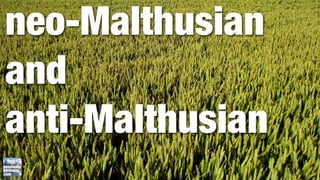
geographyalltheway.com - IB Geography: Neo-Malthusian and anti-Malthusian
- 2. Lesson Target To be able to discuss the two opposing views (neo-Malthusian and anti-Malthusian) of the relationship between population size and resource consumption.
- 5. Reverend Thomas Malthus (1766-1834) 1798: Essays on the Principles of Population Growth
- 6. Reverend Thomas Malthus (1766-1834) 1798: Essays on the Principles of Population Growth Finite optimum population size in relation to food supply
- 7. Reverend Thomas Malthus (1766-1834) 1798: Essays on the Principles of Population Growth Finite optimum population size in relation to food supply “war, famine and disease”
- 8. Reverend Thomas Malthus (1766-1834) 1798: Essays on the Principles of Population Growth Finite optimum population size in relation to food supply “war, famine and disease” Preventive checks: delay in time of marriage, abstinence from sex in marriage > reduce fertility rate
- 9. Reverend Thomas Malthus (1766-1834) 1798: Essays on the Principles of Population Growth Finite optimum population size in relation to food supply “war, famine and disease” Preventive checks: delay in time of marriage, abstinence from sex in marriage > reduce fertility rate Positive checks: lack of food, disease and war > increase death rate
- 11. Population grows at a exponential rate: 1, 2, 4, 8, 16 ....
- 12. Population grows at a exponential rate: 1, 2, 4, 8, 16 .... Food supply increases at arithmetic rate: 1, 2, 3, 4, 5 ....
- 14. neo-
- 15. neo- 1.
- 16. neo- 1. a combining form meaning “new,” “recent,” “revived,”“modified,” used in the formation of compound words: neo-Malthusian
- 18. Club of Rome model: 1970
- 19. Club of Rome model: 1970 aka Limits to Growth model
- 20. Club of Rome model: 1970 aka Limits to Growth model Five basic factors:
- 21. Club of Rome model: 1970 aka Limits to Growth model Five basic factors: population
- 22. Club of Rome model: 1970 aka Limits to Growth model Five basic factors: population agricultural production
- 23. Club of Rome model: 1970 aka Limits to Growth model Five basic factors: population agricultural production natural resources
- 24. Club of Rome model: 1970 aka Limits to Growth model Five basic factors: population agricultural production natural resources industrial production
- 25. Club of Rome model: 1970 aka Limits to Growth model Five basic factors: population agricultural production natural resources industrial production pollution
- 26. Club of Rome model: 1970 aka Limits to Growth model Five basic factors: population agricultural production natural resources industrial production pollution Consider a lily patch doubling in size each day ... it reaches a point when the pond is half covered then ...
- 27. Club of Rome model: 1970 aka Limits to Growth model Five basic factors: population agricultural production natural resources industrial production pollution Consider a lily patch doubling in size each day ... it reaches a point when the pond is half covered then ... Sudden and uncontrollable decline
- 29. Exponential growth of some factors until the limited resource base slows down growth.
- 31. Paul Ehrlich, born 1932
- 32. Paul Ehrlich, born 1932 Biologist and educator at Stanford University
- 33. Paul Ehrlich, born 1932 Biologist and educator at Stanford University 1968: Population Bomb
- 34. Paul Ehrlich, born 1932 Biologist and educator at Stanford University 1968: Population Bomb The battle to feed all of humanity is over. In the 1970s hundreds of millions of people will starve to death in spite of any crash programs embarked upon now. At this late date nothing can prevent a substantial increase in the world death rate ...
- 35. Paul Ehrlich, born 1932 Biologist and educator at Stanford University 1968: Population Bomb The battle to feed all of humanity is over. In the 1970s hundreds of millions of people will starve to death in spite of any crash programs embarked upon now. At this late date nothing can prevent a substantial increase in the world death rate ... Societies must take strong action to curb population growth in order to mitigate future disasters both ecological and social
- 39. Ester Boserup (1910-1999) 1965: The Conditions of Agricultural Growth: The Economics of Agrarian Change under Population Pressure
- 40. Ester Boserup (1910-1999) 1965: The Conditions of Agricultural Growth: The Economics of Agrarian Change under Population Pressure People have the resources to increase food production
- 41. Ester Boserup (1910-1999) 1965: The Conditions of Agricultural Growth: The Economics of Agrarian Change under Population Pressure People have the resources to increase food production Knowledge and technology
- 42. Ester Boserup (1910-1999) 1965: The Conditions of Agricultural Growth: The Economics of Agrarian Change under Population Pressure People have the resources to increase food production Knowledge and technology Increase in population stimulates a change in agricultural technique
- 44. When population and resource get close there is the need and motivation to development techniques
- 47. Julian Simon (1932-1998) Professor of Business Administration - University of Maryland
- 48. Julian Simon (1932-1998) Professor of Business Administration - University of Maryland 1981: The Ultimate Resource
- 49. Julian Simon (1932-1998) Professor of Business Administration - University of Maryland 1981: The Ultimate Resource Increasing wealth and technology make more resources available; although supplies may be limited physically they may be viewed as economically indefinite as old resources are recycled and new alternatives are developed by the market
- 50. Talk about: Population growth outstripping resource availability and thus limiting economic development
